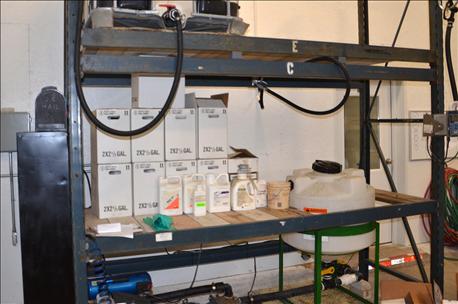
Some people are afraid to talk about safety, because they’re afraid it might jinx them. I’ve tried that, and I did something I shouldn’t do and got injured, luckily in a minor way.
I’m trying a different approach this year. Here are 10 things I am going to do to try to keep myself and my family safe. Take time to make your own list that fits your operation. The injury you prevent or the life you save might be your own.
1. Wear a face mask while running the weed trimmer.

NO TWO LABELS ARE ALIKE: Get a leg up on safety by storing chemicals properly and reading label directions on each product. No two labels are exactly the same.
I’ve tried going without goggles or a face shield, and the last time I did, I wound up with a bruise under my eye from flying debris. Face shields are available wherever weed trimmers or sold. For $50 you can get eye and ear protection. When you consider the alternative, $50 is a cheap investment.
2. Use weed sprays exactly as the label says.
No one likes to read labels. And sometimes if you’re controlling weeds around the barn or pasture instead of in a field, it can be hard to figure out the right rate. But it’s the only way to do it.
3. Use a measuring device to meter out herbicide.
A few glugs ought to do it! True confession: That’s how I’ve mixed up chemical in my hand sprayer to do fencerows before. My commitment is to take time to use the measuring device provided, or find one to use and dedicate it to that purpose. And it won’t be my wife’s measuring cup, either!
4. Wear gloves when handling chemicals.
No, I haven’t always done it. And invariably, a connection leaks on the hand sprayer, and I get the herbicide mix on my hands. It washes off, if you take time to go wash your hands when it happens. But if you forget, and then grab a snack, pesticide residue is on your food. Not smart.
5. Wear a broad-brimmed hat for sun protection.
Baseball-style caps are fine to show allegiance to a brand or team, but they don’t provide protection from the sun for much more than the top of your head and your forehead. Having already had skin cancer once, I should know better. Yet, I started this spring with a baseball cap. Now I have two wide-brimmed hats, one for working around the barn, and one for visiting your farm or going to field days.
6. Apply sunblock of the appropriate strength.
I know I need it; I just don’t always take time to do it. I’ve ended up with a swollen arm and sun poisoning already this spring. My wife just bought two new bottles of sunscreen. One will go in the garage, the other in my car.
7. Never trust animals, especially males.
My wife has already informed me that if I will miss feeding the sheep and she must do it, the ram needs to be in a pen where he can’t get access to her. He was a show lamb and likes to play. But more than one person has found out the hard way that animals can play rough, or even turn on you and be mean when you don’t expect it.
8. Keep kids or grandkids in your sight at all times.
Maybe every pickup and car should have a backup beeper to warn others when you’re backing up, but they don’t. One of my biggest concerns when the grandkids are playing in the yard or barn lot is knowing where they are, especially if I’m moving the tractor or pickup.
9. No grandkids on the riding mower while mowing.
It sounds like common sense, but I’ve seen too many people in my travels mowing the yard with a youngster on their lap. I give tractor rides, but not with a mower. It’s a no-no.
10. Work reasonable hours and then take a break.
If you are so tired that every little thing that doesn’t go right frustrates you, it’s time to shut off the tractor, climb off the mower, or stop whatever you are doing and take a break. Things look better after you are refreshed, even if it’s a short break.
About the Author(s)
You May Also Like




